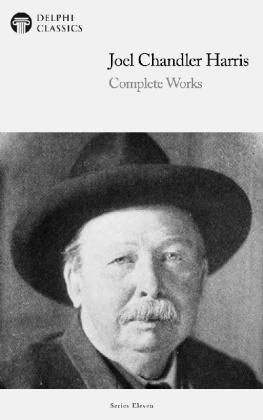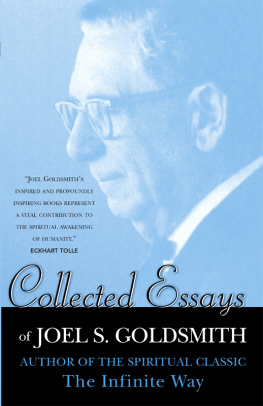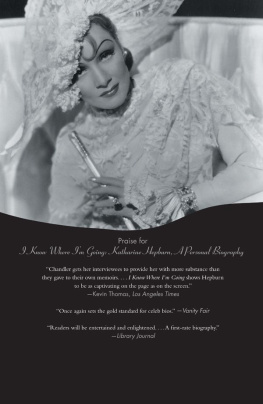
The Complete Works of
JOEL CHANDLER HARRIS
(1848-1908)

Contents

Delphi Classics 2021
Version 1


Browse our Main Series

Browse ou r Ancient Classics

Browse our Poets

Brow se our Art eBooks

Browse our Classical M usic series

The Complete Works of
JOEL CHANDLER HARRIS

By Delphi Classics, 2021
COPYRIGHT
Complete Works of Joel Chandler Harris

First published in the United Kingdom in 2021 by Delphi Classics.
Delphi Classics, 2021.
All rights reserved. No part of this publication may be reproduced, stored in a retrieval system, or transmitted, in any form or by any means, without the prior permission in writing of the publisher, nor be otherwise circulated in any form other than that in which it is published.
ISBN: 978 1 91348 751 5
Delphi Classics
is an imprint of
Delphi Publishing Ltd
Hastings, East Sussex
United Kingdom
Contact: sales@delphiclassics.com

www.delphiclassics.com

Our comprehensive editions are beautifully illustrated with the original artwork of some of the greatest children stories ever told, as well as offering a dazzling array of Delphi bonus features. Now you can rediscover the magic of these eternal classics on your eReader!
Explore Classic Childrens eBooks

The Uncle Remus Books

Eatonton, a city in Putnam County, Georgia Harris birthplace

Harris as a young man, c. 1870
Uncle Remus: His Songs and His Sayings (1881)

WITH ILLUSTRATIONS BY FREDERICK S. CHURCH AND JAMES H. MOSER
Uncle Remus: His Songs and Sayings was first published in 1881 by D. Appleton and Company in New York. It is the first book of a nine series collection of works that are centred on the character of Uncle Remus. Harris had experienced a challenging childhood in Georgia, after his father deserted the family while he was still an infant. His mother tried to support herself and her son by working as a seamstress and gardener. The author remained highly sensitive to being what was socially considered at the time an illegitimate child. He began work at fourteen at a plantation owners newspaper, The Countryman , as a Printers Devil (an apprentice that performed a number of tasks, such as mixing tubs of ink and fetching type). He was soon permitted to publish his own poems and writings in the newspaper. During the civil war, which had started the year before, The Countryman eventually became one of the most widely circulated papers in The Confederacy, giving the aspiring author much exposure.
It was through his employment by Joseph Addison Turner at Turnwold Plantation that Harris began to socialise with black slaves; this was an experience that would become vital to his career as a writer. Uncle Remus: His Songs and Sayings is a collection of African American oral folktales centred on the character of Uncle Remus , who first appeared in 1876 in Harris column in The Atlanta Constitution. The author used dialect in the work, attempting to recreate the language and grammar used by black Americans in the South. Harris later explained that he began writing the Uncle Remus stories as a serial to preserve in permanent shape those curious mementoes of a period that will no doubt be sadly misrepresented by historians of the future. The tales were reprinted across America and Harris was approached by publisher D. Appleton and Company to compile them for a book.
The resulting work is a collection of animal stories, songs, and oral folklore, often written in a didactic vein, similar to Aesop's Fables. Uncle Remus is a kindly old freedman, who serves as a story-telling device, passing on the folktales like a traditional African griot to the children gathered around him, especially to the little son of the plantation owner. The tales often interweave Uncle Remus philosophy of the world about him. The character of Uncle Remus is a compilation of Brer Rabbit storytellers that Harris had encountered during his time at Turnwold. The genre of stories is the trickster tale. Br'er Rabbit (Brother Rabbit) is usually the main character of the tales, who is prone to playing tricks and troublemaking and is often opposed by Br'er Fox and Br'er Bear.
The book was a great commercial success and led to many more stories about Uncle Remus over the course of Harris career. The critical reception of the twentieth and twenty-first centuries has been mixed and fraught with disagreement. In 1981, renowned author Alice Walker criticised Harris and his work in an essay entitled Uncle Remus, No Friend of Mine, where she berated him for stealing part of her heritage By making [her] feel ashamed of it.

The first edition
CONTENTS

Next page






























